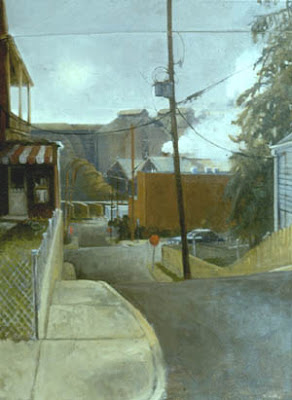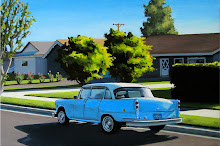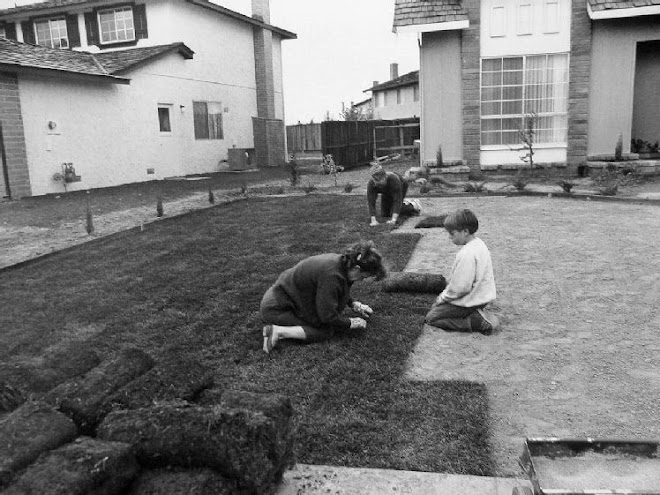
Exhausted and unstable, she eventually leaned against the side of her cousin's porch. For the first time, wood supported her. For once, she could cry without being insulted but for some reason now she couldn't find the ability within her. How could she not find the weakness to cry? How could she not unarm herself and release everything? Maybe she underestimated how much strength it took to cry. Maybe it took more power than anything. She had cried before, in a previous life, countless times. It was the same heart in her rib cage. Maybe it just had become so thick, so concrete, that it forgot how to send the impulse for tears. It could be worn down to what it was before. The heart of a woman was as innocent and sensitive as a child's.
Confused and sympathetic, he joined her against the wood of the porch. He watched her profile, waiting for the opportune moment o touch her. It agitated him, made his toes curl down in his sneakers. Thinking about it made his pants a little tight. Instead though, he examined her tight jaw line and jagged chin. Her forehead ran into the slope of her nose. Her eyes, vibrant and engaged, lay back, deep in her face. He traced oneof her broad shoulders down to her muscled arm as she rested her spidery hands against the top of the porch, perched like a raven. He muscle was tense and the indent of it reminded him of a slope.
He would simply admire her silently and wait for her to speak. A part of him moved his eyes to her collarbone, and down her chest to her breasts. Feeling guilty, he looked back to her face, her crooked lips. She looked like she was trying to make sense of something, some difficult enigma of life. Her eyes appeared so distant. He shifted himself more toward her and sat on top of the porch, his feet dangling. Patiently, he would wait for her words like he was suppose to. With sincerity, with empathy, with genuine affection.
But she didn't say anything and her eyes remained somewhere else. She was most likely thinking about money, if anything. That had been the topic of argument with her cousin, Nate. She needed a lot of money and he was against simply giving it to her. She promised, with puppy-dog eyes, that she would pay him back, "every penny", but he was stubborn...or smart.
She came into the small neighborhood nearly six months ago. Or was it seven? She had a single suitcase with almost nothing inside and was let off in her cousin's quaint neighborhood. Her whole persona contrasted with the flowers and bright green lawns of the suburb. She didn't belong there and it was a difficult sight to look at. Almost like torn flesh being pealed from itself. To her, the sun was probably blinding, the air most likely stung her lungs, and a migraine likely ensued due to the bright colors. Nate saw her, disheveled and tired. He didn't take notice to the pealing skin and the contrast she placed on his front lawn because of his shock. He hadn't seen her in half a decade and now she was standing behind the screen of his front door, looking vastly different. It was the same face on a new body. If they hadn't been so close previously, he would not have recognized her -- the new her.
Crying, she lay on his living room couch for a whole week without explanation as to what happened to her and why she had shown up in the first place. She eventually left the couch, got dressed in whatever she had and went out to a bar. There she met her boy after completing an intoxicated karaoke performance. She seemed to have ceased releasing her depression, at least for a couple of days. When her cousin began demanding some sort of explanation, arguments ensued. When she explained the money and support she needed, he became enraged. "This is bullshit," he had said. He would not just throw everything he earned on his own to her. She needed to earn it herself, he told her.
She seemed to have ignored her cousin's words and more arguments erupted in his quaint living room. He told her, asked her, why she wouldn't admit the truth and be honest with the people in her life now -- she could start new, he told her. She seemed to try and gain sympathy from him, as she confessed the abuse she faced from her father. Although his face became soft and his eyes rested, he did not develop enough sympathy to understand her actions. It was simply impossible for him, he admitted. He didn't understand, he said, how a person couldn't be honest with the people he or she loved. But the truth was, she had to be honest with herself, however, at that point she could not face herself, even in a mirror.
Tonight had been the worst. She had been threatened by Nate. She was warned and given two options, altering and consequential. Nate told her, with such anger and misunderstanding, that either she told her "new boy the truth" or he would. And then he said, before disappearing into his bedroom, that he would "kick her lying ass out" if she didn't start "manning up." How those words resonated and stung her when he said them. She looked like a piece of wall crumbling after erosion and nature. Her father use to tell her: "Be a man." But she wasn't, how was it possible?
She called him immediately her, her new boy she met at the bar. She had nobody else now.
He always thought of himself as empathetic and understanding. He was a great listener, his friends had told him and he seemed to comfort others adeptly. All the previous preparation and experience couldn't prepare him for her secret.
What was melancholy to her was that she had been content with him for the six or seven months she had with him. This was her first relationship. He was ecstatic and caring but something loomed in her eyes and he took notice. He tried, with great efforts, to change her view of the dark and judgmental world. He he hoped that tonight he would finally discover what had been bothering her since he had met her. He could curiously caring.
He could never do more than kiss her. Her hands would roam but she never let him touch her except for the occasional hug. He probably thought of this as strange but she had used the excuse that this was her "first real relationship" and she "didn't want to mess it up." She was "still getting use to it all." She even looked rigid sometimes when he'd go to wrap her in his arms as if she hated the feeling of being touched, as if he was going to crack her porcelain skin. But he asked for no further explanation or reason. He was curiously, cautiously caring.
The thought of creating some sort of lie more than likely crossed her mind. She couldn't sit anymore in silence and listen to the crickets and the peace of the neighborhood. It had to be now and she had to confess. But she obviously was not ready. It would have destroyed them. It would have torn away at any sort of development she worked for. All she needed, she said to Nate, was a surrounding where nobody knew her in order to bury the old her. Maybe she believed that her cousin would allow her to became her new self in his home. Maybe she thought his home would be some sort of sanctuary. It was miles away from the torture she faced and the struggles she ran from that concerned her identity.
She took in a breath and finally looked at the boy's face. His eyes dug into her but not deep enough. They rested in his soft face. She tried to smile for him but it appeared incredibly forced. She gathered in the fresh, suburban air and prepared to lose him.
"You're so quiet," she murmured with the crickets. Her muscles relaxed some and he gave her a warm smile.
"I don't mind much," he responded.
"Thanks for being patient with me. I know it's probably a pain."
"Not really."
She couldn't tell him. She probably couldn't gather the strength or courage. It was likely that she justified in her mind manipulating him, twisting the reality so that she would be content, safe, secure.
She said, "My cousin is kicking me out."
"Why would he do that?"
"He can't afford having me and I've been trying to find a job but I can't. He doesn't want to waste anymore money on me."
"But he's your cousin. You're family. That's terrible."
"And now I have nowhere to go and no money. And I can't go back home."
"Of course not."
"I'm such a burden."
But she didn't say anything and her eyes remained somewhere else. She was most likely thinking about money, if anything. That had been the topic of argument with her cousin, Nate. She needed a lot of money and he was against simply giving it to her. She promised, with puppy-dog eyes, that she would pay him back, "every penny", but he was stubborn...or smart.
She came into the small neighborhood nearly six months ago. Or was it seven? She had a single suitcase with almost nothing inside and was let off in her cousin's quaint neighborhood. Her whole persona contrasted with the flowers and bright green lawns of the suburb. She didn't belong there and it was a difficult sight to look at. Almost like torn flesh being pealed from itself. To her, the sun was probably blinding, the air most likely stung her lungs, and a migraine likely ensued due to the bright colors. Nate saw her, disheveled and tired. He didn't take notice to the pealing skin and the contrast she placed on his front lawn because of his shock. He hadn't seen her in half a decade and now she was standing behind the screen of his front door, looking vastly different. It was the same face on a new body. If they hadn't been so close previously, he would not have recognized her -- the new her.
Crying, she lay on his living room couch for a whole week without explanation as to what happened to her and why she had shown up in the first place. She eventually left the couch, got dressed in whatever she had and went out to a bar. There she met her boy after completing an intoxicated karaoke performance. She seemed to have ceased releasing her depression, at least for a couple of days. When her cousin began demanding some sort of explanation, arguments ensued. When she explained the money and support she needed, he became enraged. "This is bullshit," he had said. He would not just throw everything he earned on his own to her. She needed to earn it herself, he told her.
She seemed to have ignored her cousin's words and more arguments erupted in his quaint living room. He told her, asked her, why she wouldn't admit the truth and be honest with the people in her life now -- she could start new, he told her. She seemed to try and gain sympathy from him, as she confessed the abuse she faced from her father. Although his face became soft and his eyes rested, he did not develop enough sympathy to understand her actions. It was simply impossible for him, he admitted. He didn't understand, he said, how a person couldn't be honest with the people he or she loved. But the truth was, she had to be honest with herself, however, at that point she could not face herself, even in a mirror.
Tonight had been the worst. She had been threatened by Nate. She was warned and given two options, altering and consequential. Nate told her, with such anger and misunderstanding, that either she told her "new boy the truth" or he would. And then he said, before disappearing into his bedroom, that he would "kick her lying ass out" if she didn't start "manning up." How those words resonated and stung her when he said them. She looked like a piece of wall crumbling after erosion and nature. Her father use to tell her: "Be a man." But she wasn't, how was it possible?
She called him immediately her, her new boy she met at the bar. She had nobody else now.
He always thought of himself as empathetic and understanding. He was a great listener, his friends had told him and he seemed to comfort others adeptly. All the previous preparation and experience couldn't prepare him for her secret.
What was melancholy to her was that she had been content with him for the six or seven months she had with him. This was her first relationship. He was ecstatic and caring but something loomed in her eyes and he took notice. He tried, with great efforts, to change her view of the dark and judgmental world. He he hoped that tonight he would finally discover what had been bothering her since he had met her. He could curiously caring.
He could never do more than kiss her. Her hands would roam but she never let him touch her except for the occasional hug. He probably thought of this as strange but she had used the excuse that this was her "first real relationship" and she "didn't want to mess it up." She was "still getting use to it all." She even looked rigid sometimes when he'd go to wrap her in his arms as if she hated the feeling of being touched, as if he was going to crack her porcelain skin. But he asked for no further explanation or reason. He was curiously, cautiously caring.
The thought of creating some sort of lie more than likely crossed her mind. She couldn't sit anymore in silence and listen to the crickets and the peace of the neighborhood. It had to be now and she had to confess. But she obviously was not ready. It would have destroyed them. It would have torn away at any sort of development she worked for. All she needed, she said to Nate, was a surrounding where nobody knew her in order to bury the old her. Maybe she believed that her cousin would allow her to became her new self in his home. Maybe she thought his home would be some sort of sanctuary. It was miles away from the torture she faced and the struggles she ran from that concerned her identity.
She took in a breath and finally looked at the boy's face. His eyes dug into her but not deep enough. They rested in his soft face. She tried to smile for him but it appeared incredibly forced. She gathered in the fresh, suburban air and prepared to lose him.
"You're so quiet," she murmured with the crickets. Her muscles relaxed some and he gave her a warm smile.
"I don't mind much," he responded.
"Thanks for being patient with me. I know it's probably a pain."
"Not really."
She couldn't tell him. She probably couldn't gather the strength or courage. It was likely that she justified in her mind manipulating him, twisting the reality so that she would be content, safe, secure.
She said, "My cousin is kicking me out."
"Why would he do that?"
"He can't afford having me and I've been trying to find a job but I can't. He doesn't want to waste anymore money on me."
"But he's your cousin. You're family. That's terrible."
"And now I have nowhere to go and no money. And I can't go back home."
"Of course not."
"I'm such a burden."
This is when he made his effort to touch her. He seemed to hesitate at first, probably because she hadn't started crying. But his hand went to her back, on her right shoulder blade. He then moved his hand to her shoulder and pulled her into him. She looked stiff against him but rested her head against his chest.
Her mother once tried to send her to a psychiatrist once. She thought her daughter had a disorder and demanded she got help. She had just turned twelve. She didn't understand what was wrong with her. She asked her mom if it was her disorder that made her father hate her. Her mother told her yes.
Doctor Jung had told her mother that her daughter may have a mild form of a dissociative disorder. He explained the disorder to her mother, saying it occurs when a person "exhibits two or sometimes more distinct and altering personalities." She told her doctor that she had one personalitiy and that she did not have another mind. But the doctor told her that often times, the other personality was outside the consciousness of the other.
For two years she underwent therapy and believed there was a side of her that she hadn't fully seen. It may have explained her uncomfortable feelings. Her disorder then changed to a "borderline personality disorder." What did that encompass? "An unstable identity, unstabl relationships, and unstable emotions."
She knew who she was. She was a child and still establishing herself. Of course she didn't have a stable identity yet. The medicine and therapy continued until she emancipated herself from her family. She lived on her own, made little money, and often times ended up stealing from her family as well as strangers. She became sick, was hospitalized, and brought home where she began undergoing self-imposed changes.
"You can stay with me if you'd like. Until you get back on your feet," he said to her.
She relaxed more, releasing cool air from her lungs. Some euphoric resonance built up in her stomach -- her same stomach from before. It was a new energy, a new force she hadn't felt before. This is probably how she felt. This is probably how she pictured a man, cradling a woman he cared for, sheltering her from the outside world. A man was suppose to encage her in his arms, take her back in his rib cage.
Despite this moment, there was a haze lurking around her body. He couldn't see it but it was doubtful she could feel it either. She could ignore it.
"I'll go pack my stuff," she said, breaking away from him. She wanted to slip out before her cousin saw her, before he intervened. She snuck into the house and into her make-shift bedroom. Packing her belongings, she realized Nate wouldn't stand for this. He always enjoyed getting his hands on other's business. Eventually he would expose her and this would be worthless. She momentarily stopped packing, probably contemplating. Should she enjoy these last moments of peace? Should she leave it all on a positive memory?
Meanwhile, he smiled outside on the porch. He strolled back and forth, maybe thinking of words he could say to her when she came back out. Maybe he even pictured a wedding scene or some sort of engagement. How easy it must have looked.
Time passed. Too much time had passed for his daydreams. He stepped into the house, quietly calling her name. He had never been in the house previously and he had no idea where she may be.
But there was grass underneath her feet by now, wet dew clinging to her ankles.
It wasn't long before a man, undoubtedly Nate, exited from a room, looking at him quizzically.
"Who the hell are you?" He looked like a lion. After explaining to Nate who he was, Nate lead him to his cousin's room, watching the floor as if it were going to collapse. The bedroom door was opened and the room was empty. Nate quickly entered, checking the bureaus and closets. All the little things she had carried in her one suitcase were gone. There wasn't a letter or a note, not a single thank you. Insetad there was missing food from the kitchen, missing money from Nate's wallet, missing explanations.
Nate didn't say much to the new stranger in his house. Clearly she hadn't told her boyfriend a single piece of truth. He explained to Nate that she had just decided on the porch that she was going to move in with him because she was being kicked out. Nate huffed, an eerie, uncomfortable huff, shook his head and retired into his bedroom, leaving the boy there, stuck in a haze.
He silently made his way out of town without a letter even years later. There wasn't an apology or a return of money. There wasn't a return of time. He succeeded in blinding others. It's not worth knowing if he eventually succeeded in gathering the finances he needed. Because the people he left behind eventually recovered, eventually steadied themselves, and removed the small dent he had left in them.










